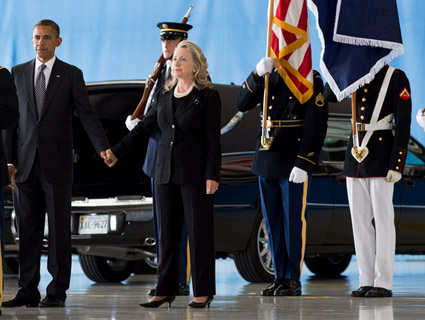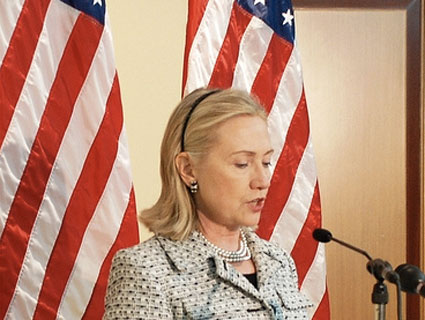
President Barack Obama and Secretary of State Hillary Clinton at Andrews Air Force Base on September 14 during the return of the remains of four Americans killed in Benghazi three days earlier.<a href="http://www.flickr.com/photos/whitehouse/8077972177/">The White House</a>/Flickr
Today, the House and Senate intelligence committees are starting hearings on the September 11 attack on the US consulate in Benghazi, Libya, that killed four Americans including Ambassador Chris Stevens. At the heart of the issue is the allegation, embraced by conservative pundits and echoed by Republicans including Mitt Romney, that Obama adminstration has covered up what they knew about the true nature of the assault and when they knew it.
Here’s a blow-by-blow look at how the events and statements under scrutiny unfolded. Kevin Drum has more on why the Benghazi controversy has been overblown. And for a more extensive, detailed timeline, visit FactCheck.org.
September 11
- A protest breaks out at the US embassy in Cairo in response to Innocence of Muslims, an anti-Muslim film advertised on YouTube that was created by a real estate developer in California. The film’s trailer was first posted in July.
- The US consulate in Benghazi, Libya, is attacked by “unidentified Libyan extremists,” who kill US Ambassador to Libya Chris Stevens and three other American officials.
- Secretary of State Hillary Clinton issues a statement acknowledging the death of one State Department official during Benghazi attack. The statement references the anti-Muslim video, condemning “any intentional effort to denigrate the religious beliefs of others,” but stops short of blaming it for the attack.
September 12
- Clinton confirms that four US officials were killed in the Benghazi attack.
- During a morning speech at the Rose Garden, President Obama condemns the attack, saying, “No acts of terror will ever shake the resolve of this great nation.” He also echoes Clinton’s acknowledgment of the anti-Muslim video, saying, “We reject all efforts to denigrate the religious beliefs of others.”
- Obama is asked during a 60 Minutes interview whether terrorists were behind the attack and replies that “it’s too early to know exactly how this came about.” Reporters later ask White House press secretary Jay Carney if the attack had been preplanned. Carney replies, “It’s too early for us to make that judgment.”
- The BBC talks to Ahmad Jibril, Libya’s deputy ambassador to London, who says that the militant group Ansar al-Sharia launched the Benghazi attack.
- Citing anonymous government officials, Reuters reports that the attack may have been preplanned and Ansar al-Sharia may be to blame.
September 13
- At a State Department function, Libyan Ambassador to the United States Ali Suleiman Aujali speaks to Clinton, apologizing for “this terrorist attack which took place against the American consulate in Libya.” Clinton again condemns the anti-Muslim video but does not refer to the attack as an act of terror. (Clinton later meets with Moroccan Foreign Minister Saad-Eddine al-Othmani, saying much the same thing.)
- During a Colorado stump speech, Obama says, “To all those who would do us harm, no act of terror will go unpunished.”
- Citing anonymous State Department officials, CNN reports that the Benghazi attack was a “clearly planned military-type attack” and not related to the anti-Muslim video.
September 14
- At an Andrews Air Force Base ceremony honoring the officials killed in Benghazi, Clinton quotes from a letter that Palestinian Authority President Mahmoud Abbas sent her, in which she says he praised Stevens and called the attack “an act of ugly terror.”
- At a White House press briefing, Carney says the CNN report that the US government has evidence the attack was preplanned “is false.”
- Roll Call reports that during a Senate Armed Services Committee meeting, Defense Secretary Leon Panetta leaves committee members with the impression that the attack was a premeditated act of terror.
September 15
- In his weekly address, Obama mentions the Benghazi attack. He does not refer to it as an act of terror, but mentions “every angry mob” that had reacted to the anti-Muslim video.
September 16
- Susan Rice, the US ambassador to the United Nations, speaking to Bob Schieffer on CBS’s Face the Nation, suggests that the attack began “spontaneously” in reaction to the Cairo embassy protest that was “sparked by this hateful video.”
- Libya President Mohamed Magariaf, also speaking to Schieffer, says the attack “was planned by foreigners…who entered the country a few months ago.” He later tells NPR that Rice’s suggestion that the protest began spontaneously “is completely unfounded and preposterous.”
September 17
- State Department spokeswoman Victoria Nuland says, “The comments that Ambassador Rice made accurately reflect our government’s initial assessment.”
September 18
- Obama tells David Letterman that extremists used the anti-Muslim video “as an excuse” for several attacks including the one in Benghazi.
- Carney tells reporters that the video “precipitated some of the unrest in Benghazi and elsewhere.” Later, Clinton says she was told that “we had no actionable intelligence that an attack…was planned or imminent.”
September 19
- National Counterterrorism Center Director Matt Olsen, speaking to a Senate subcommittee, says that the American officials in Benghazi “were killed in the course of a terrorist attack on our embassy” but that there was “no specific evidence of significant advanced planning.” Olsen is the first administration official on record using the phrase “terrorist attack.”
- Nuland tells reporters that she stands by Olsen’s words, but Carney balks, just repeating that “we do not yet have indication that [the attack] was preplanned or premeditated.”
September 20
- Carney refers to the Benghazi incident as a “terrorist attack” for the first time. Asked about Carney’s remarks on the stump, Obama says only that extremists had taken advantage of “natural protests” that arose from the anti-Muslim video.
September 21
- Clinton calls the Benghazi incident a “terrorist attack” for the first time.
September 24
- Asked on The View if the Benghazi incident was a terrorist attack, Obama replies, “We’re still doing an investigation.” At a UN address the next day, Obama condemns the anti-Muslim video but doesn’t refer to a terrorist attack.
September 27
- Panetta tells reporters that Benghazi “was a terrorist attack” and that it “took a while to really get some of the feedback from what exactly happened at that location.”
- Carney tells reporters, “The president’s position [is] that this was a terrorist attack.”
October 9
- During a briefing, State Department officials contradict the Obama administration by saying there had been no protest before the Benghazi attack.
October 10
- Asked about discrepancies in the various responses to the attack, Carney replies, “Again, from the beginning, we have provided information based on the facts that we knew as they became available.”
October 15
- Clinton says that she bears the responsibility for failing to protect Stevens in Benghazi. She also tells CNN that the “fog of war” initially led the State Department to blame the anti-Muslim video for the attack.
- The New York Times reports that the video was, in fact, used as a justification for the attack.
October 16
- At the second presidential debate, Mitt Romney repeats a popular conservative talking point, saying that “it took the president 14 days before he called the attack in Benghazi an act of terror.” Moderator Candy Crowley attempts to fact-check Romney on the spot, citing Obama’s September 12 Rose Garden “terror” remark.
October 24
- Government emails suggest that the White House and State Department were told around the time of the Benghazi attack that Ansar al-Sharia had claimed responsibility. But the emails appear to be incorrect.
- Carney disputes the emails, saying that Ansar al-Sharia claimed it wasn’t responsible after the attack. “Neither should be taken as fact,” Carney continues. “That’s why there’s an investigation underway.”
October 26
- A conspiracy theory begins to circulate that General Carter Ham, the head of the US command in Africa, was “relieved of his command” after refusing orders to stand down as he attempted to dispatch a rescue unit to the Benghazi consulate.
November 9
- CIA Director David Petraeus resigns over a sex scandal, which leads to another right-wing conspiracy theory: He must have stepped down to avoid testifying on the Benghazi attack.
November 14
- Republicans John McCain and Lindsey Graham, who both sit on the Senate Armed Services Committee, announce that they would oppose a nomination of Susan Rice to replace Hillary Clinton as secretary of state. Graham justifies his position, saying that “either [Rice] didn’t know the truth about Benghazi—so she shouldn’t have been on TV—or she was spinning it.”
November 15
- The House and Senate Intelligence Committees begin holding hearings on the Benghazi attack. Petraeus, scheduled to testify on November 16, says his resignation had nothing to do with Benghazi.
This article has been revised.














